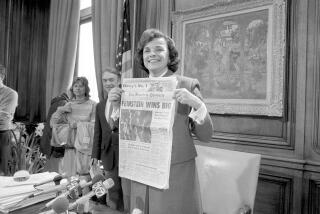For Retired Teachers, Education Becomes a Matter of Prime Time
- Share via
PHILADELPHIA — Edna Green devoted her life to education, retiring nine years ago as head of the science department at a public high school for gifted girls.
Today she is back in school, a student this time, under a program at the University of Pennsylvania that permits retirees to audit courses in exchange for volunteer work. They are also asked to contribute $50 per semester to a scholarship fund.
Retirees can audit anything from poetry to engineering and can use the gymnasium and pool and receive other student benefits, such as reduced theater rates.
They volunteer as tutors, counselors, technical assistants, office and library assistants.
Last semester, Green took courses in speech, sculpture and poetry. She is looking ahead to the fall schedule and volunteered at the campus information center.
The 9-year-old Senior Associates Volunteering Valuable Years program (SAVVY) at Penn grew out of a trend that began in the 1970s, when retired teachers sought ways to stay intellectually active without the pressures and expenses of seeking degrees.
Other programs still going include “Prime Timers” at California’s state universities, “Learning in Retirement” at Duke University in North Carolina and the “Senior Adult Program” at Phoenix College in Arizona.
The special slant at Penn is getting seniors involved in all aspects of campus life, even as living textbooks for history students, said Nancy Ellis, associate director for education at the Center for the Study of Aging at Penn.
As a U.S. history requirement, for example, Bruce Kuklick has students interview people who lived through the Depression, World War II and the New Deal.
The 200 senior associates for this year came from teaching, engineering and business backgrounds. They range from 62 to older than 90, but most are in their 70s.
The program began in 1981 when Norton Shapiro, a federal government retiree who was auditing courses, suggested an organization for retirees on campus.
Until 1986, Shapiro was chairman of SAVVY’s steering committee, which meets monthly to organize activities.
The program was strictly academic at first, said Green, who earned her master’s degree in biology at Penn.
“The volunteer business didn’t come until later, when we thought we ought to give something back to the university for what they were giving us,” she said.
But, Ellis said, the seniors wanted to be real contributors.
“We do not want to stuff envelopes, we don’t want to file in somebody’s back room, and we don’t want to do menial tasks,” Ellis said.
More to Read
Sign up for Essential California
The most important California stories and recommendations in your inbox every morning.
You may occasionally receive promotional content from the Los Angeles Times.













